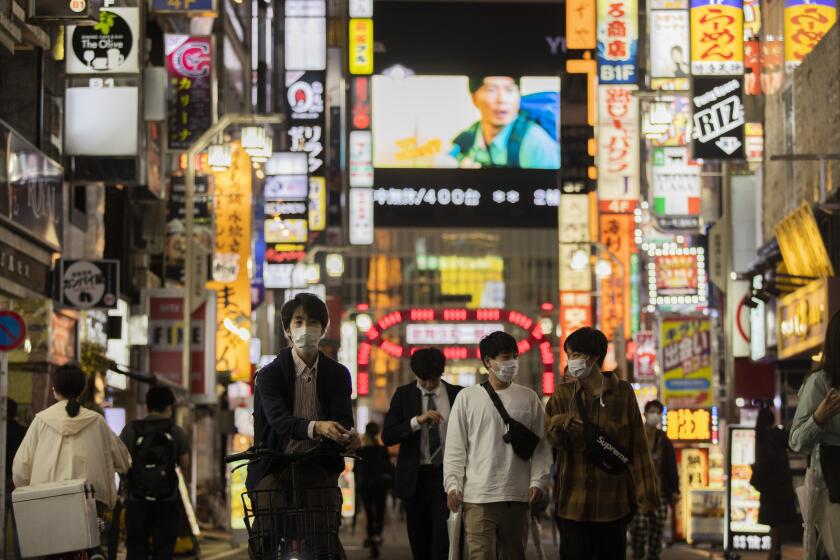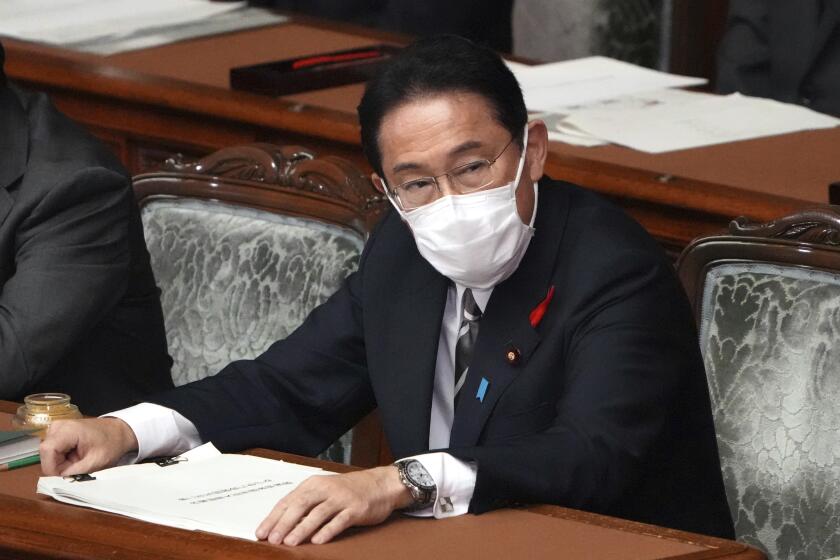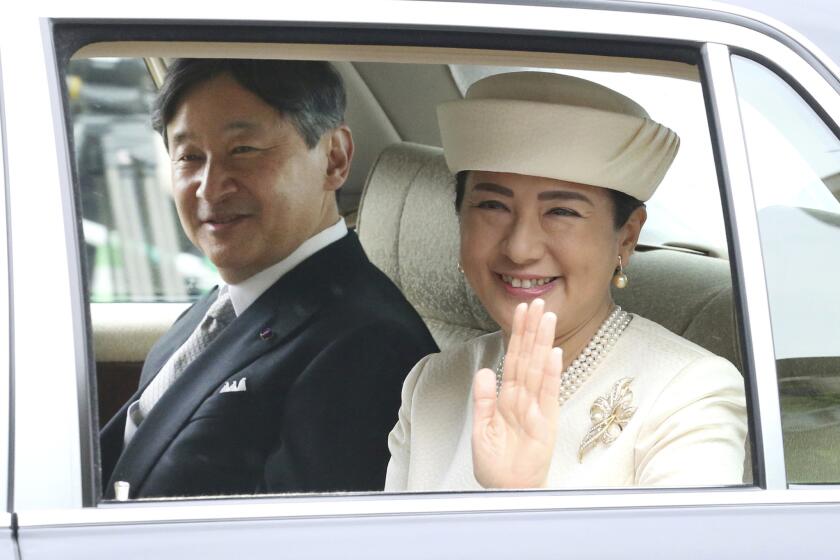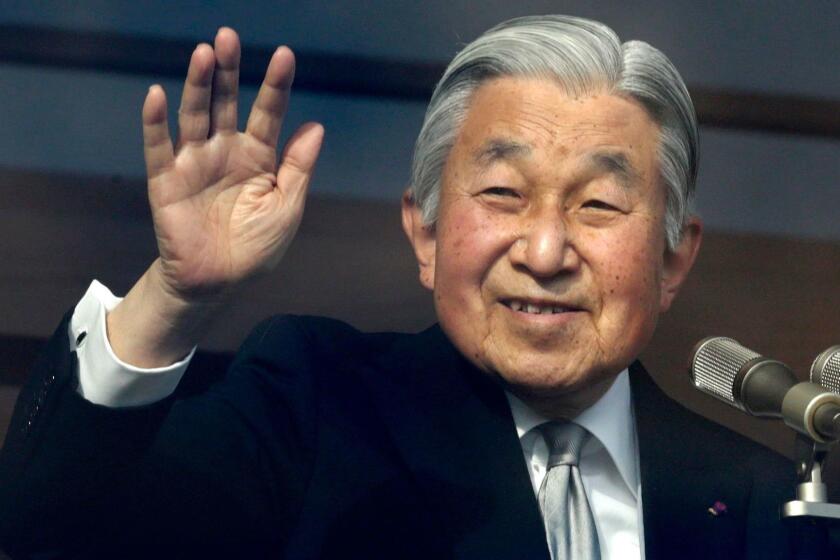Japan’s Princess Mako marries commoner Kei Komuro and loses her royal status
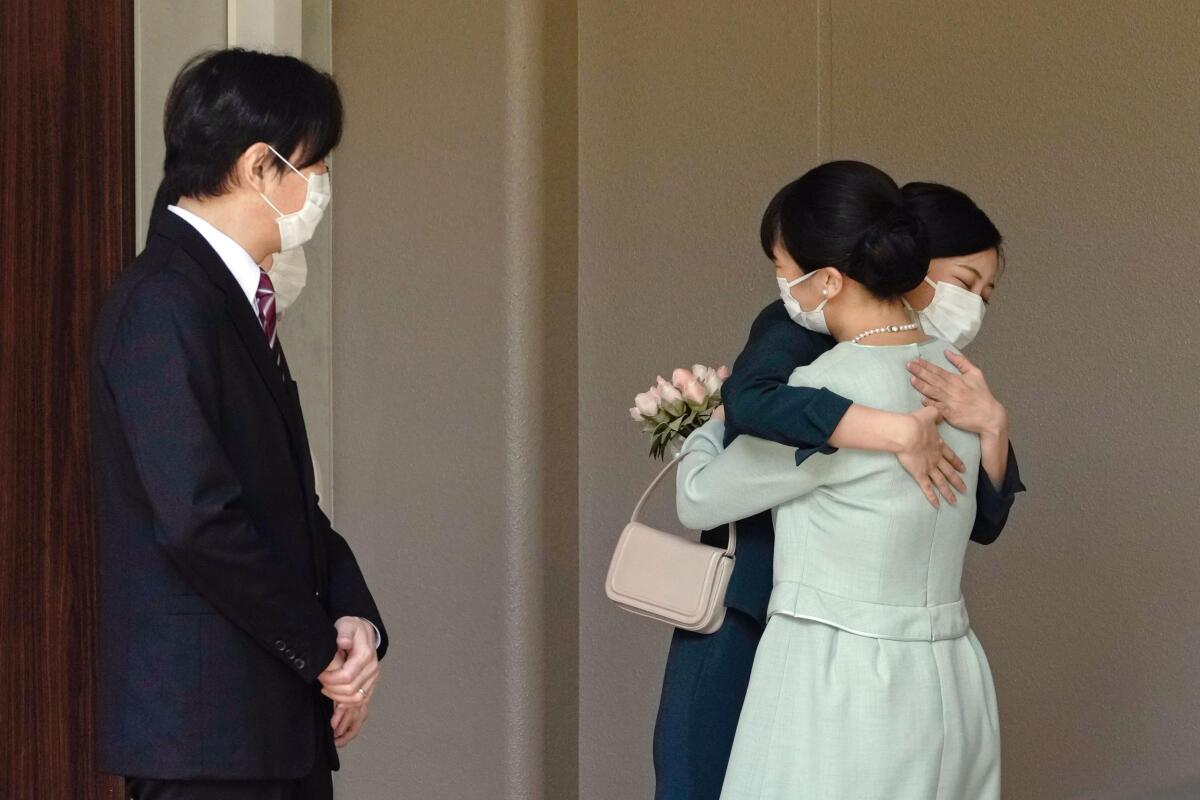
- Share via
TOKYO — Japan’s Princess Mako quietly married a commoner without traditional wedding celebrations Tuesday and said their marriage — delayed three years and opposed by some — “was a necessary choice to live while cherishing our hearts.”
Her marriage to Kei Komuro cost Mako her royal status, and she has taken her husband’s surname — the first time she has had a family name. Most Japanese women must abandon their own family names upon marriage because of a law requiring only one surname per married couple.
The couple’s marriage document was submitted by a palace official Tuesday morning and made official, the Imperial Household Agency said. There was no wedding banquet or other marriage rituals for the couple. Their marriage is not celebrated by many people, the agency has said.
“For me, Kei-san is a priceless person. For us, our marriage was a necessary choice to live while cherishing our hearts,” Mako told a televised news conference, using an honorific in speaking of her husband.
Komuro responded: “I love Mako. I live only once, and I want to spend it with someone I love.” He said he hopes to be with Mako to encourage each other at happy times and difficult times.
“I hope to have a warm family with Mako-san, and I will continue to do everything to support her,” he said.
Almost overnight, Japan has become an extraordinary, and somewhat mysterious, success story in its efforts to contain the coronavirus.
Mako earlier declined the $1.23-million dowry to which she was entitled for leaving the imperial family, palace officials said. She is the first imperial family member since World War II not to receive the payment and chose to decline because of criticism of the marriage.
Mako, who turned 30 three days before the wedding, is a niece of Emperor Naruhito. She and Komuro were classmates at Tokyo’s International Christian University when they announced in September 2017 they intended to marry the following year, but the financial dispute surfaced two months later and the wedding was suspended.
On Tuesday morning, Mako left the palace wearing a pale blue dress and holding a bouquet. She bowed outside the residence to her parents, Crown Prince Akishino and Crown Princess Kiko, and her sister, Kako, and then the sisters hugged each other.
The newlyweds did not answer questions at the news conference, as Mako had expressed fear and unease about responding to them in person. Instead, they provided written answers to questions submitted by the media beforehand, including those about his mother’s financial issues.
In his first policy speech, new Prime Minister Fumio Kishida promised to improve Japan’s pandemic response, revive the economy and bolster defense.
Mako is recovering from what palace doctors described earlier this month as a form of traumatic stress disorder that she developed after seeing negative media coverage about their marriage, especially attacks on Komuro.
The financial dispute involves whether money his mother received from her former fiance was a loan or a gift. Mako’s father asked Komuro to clarify, and he wrote a statement defending himself, but it is still unclear whether the dispute has been fully resolved.
“We have been horrified, scared and saddened ... as false information has been taken as fact and that unfounded stories have spread,” Mako said in a written answer to one of the questions.
Komuro, 30, left for New York in 2018 to study law and returned to Japan only last month. His hair, tied in a ponytail, captured attention as a bold statement for someone marrying a princess in the tradition-bound imperial family and only added to the criticism.
Japan’s imperial palace has a new resident who earned an economics degree from Harvard, speaks at least five languages and has negotiated complicated trade deals as a diplomat.
The couple will move to New York. Many in Tokyo wished them good luck.
“Congratulations,” said office worker Yasuhiro Suzuki. “I hope people in America will welcome them.”
Retiree Kenko Suzuki said he expects life in New York will be challenging because they will have to live without people taking care of them. “So I’m rooting for them,” he said.
“There will be different kinds of difficulties as we start our new life, but we’ll walk together as we have done so in the past,” Mako said, thanking everyone who supported her and Komuro.
Emperor Akihito, credited with bringing Japan’s monarchy closer to the people, prepares to step down
On Tuesday, Japan’s 85-year-old Emperor Akihito was scheduled to end his reign and hand the seat of the longest-running monarchy in the world to his son, Crown Prince Naruhito.
Mako, apparently referring to mental health issues, noted that “many people have difficulty and hurt feelings while trying to protect their hearts.” She said: “I sincerely hope that our society will be a place where more people can live and protect their hearts with the help of warm help and support from others.”
Mako is not the only Japanese female royal whose mental health was strained by attacks from inside and outside the palace.
Her grandmother, Empress Emerita Michiko, wife of former Emperor Akihito and the first commoner married to a monarch in modern history, collapsed and temporarily lost her voice in 1993 following persistent negative coverage.
Empress Masako, a Harvard-educated former diplomat, has had a stress-induced mental condition for nearly 20 years, in part because of criticism over not producing a male heir.
Start your day right
Sign up for Essential California for the L.A. Times biggest news, features and recommendations in your inbox six days a week.
You may occasionally receive promotional content from the Los Angeles Times.
Some critics say Mako’s marriage highlights the difficulties faced by women in the Japanese imperial household.
Her loss of royal status comes from the Imperial House Law, which allows only male succession.
The male-only succession policy leaves only Akishino and his son, Prince Hisahito, in line behind Emperor Naruhito. A panel of government-appointed experts is discussing a stable succession of the Japanese monarchy, but conservatives still reject female succession or allowing female members to head the imperial family.
More to Read
Sign up for Essential California
The most important California stories and recommendations in your inbox every morning.
You may occasionally receive promotional content from the Los Angeles Times.
